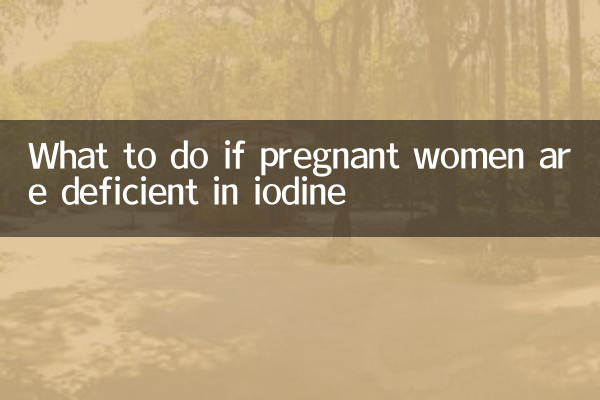What to do if pregnant women are deficient in iodine
Iodine is an essential trace element for the human body and is crucial for the health of pregnant women and fetuses. Iodine deficiency in pregnant women may lead to fetal mental retardation, thyroid dysfunction and other problems. Recently, discussions about iodine deficiency in pregnant women have become a hot topic on major health platforms and social media. This article will give you a detailed introduction to the dangers of iodine deficiency in pregnant women, how to scientifically supplement iodine, and related precautions.
1. The dangers of iodine deficiency in pregnant women

Iodine deficiency in pregnant women will have serious consequences for the health of mother and baby. The following are the main hazards:
| Harmful objects | Specific performance |
|---|---|
| fetus | Mental retardation, congenital hypothyroidism, low birth weight |
| pregnant woman | Thyroid enlargement, pregnancy-induced hypertension, and increased risk of miscarriage |
2. How to determine whether pregnant women are iodine deficient
Pregnant women can initially determine whether they are iodine deficient through the following methods:
| Judgment method | Specific methods |
|---|---|
| Symptom observation | Neck swelling, fatigue, abnormal weight gain, dry skin |
| medical examination | Urine iodine test, thyroid function test |
3. Scientific methods of iodine supplementation for pregnant women
Pregnant women need to follow scientific principles when supplementing iodine. The following are the recommended ways to supplement iodine:
| Iodine supplementation method | Specific content |
|---|---|
| Dietary iodine supplement | Kelp, seaweed, marine fish, shrimp, shellfish, iodized salt |
| supplements | Multivitamin during pregnancy (containing iodine 150-250μg) |
| Things to note | Avoid excessive iodine supplementation (no more than 600 μg per day) |
4. Reference for iodine content of common iodine-containing foods
The following is the iodine content of common foods (per 100g edible part):
| food name | Iodine content (μg) |
|---|---|
| Kelp (dried) | 36000 |
| Seaweed (dried) | 18000 |
| Shopee | 264 |
| Hairtail | 40 |
| eggs | 27 |
| milk | 15 |
5. Precautions for iodine supplementation for pregnant women
1.principle of moderation: The Chinese Nutrition Society recommends that the daily iodine intake of pregnant women is 230 μg, and that of lactating women is 240 μg.
2.balanced diet: It is not advisable to rely solely on a single food to supplement iodine, and a diverse diet should be maintained.
3.Regular inspection: Thyroid function and urine iodine testing should be performed regularly during pregnancy.
4.Special case handling: Pregnant women who have been diagnosed with thyroid disease should supplement iodine under the guidance of a doctor.
5.cooking method: When using iodized salt, avoid long-term cooking at high temperatures to reduce the loss of iodine.
6. Expert advice
According to the recent guidelines issued by the Perinatal Medicine Branch of the Chinese Medical Association, it is recommended:
| crowd | Suggestions |
|---|---|
| Women preparing for pregnancy | Start paying attention to iodine intake 3 months in advance |
| early pregnancy women | Prioritize iodine intake |
| lactating women | Continue to maintain high iodine intake |
Summary: The problem of iodine deficiency in pregnant women cannot be ignored. Scientific iodine supplementation needs to start from many aspects such as diet, testing, and monitoring. It is recommended that pregnant women develop a personalized iodine supplement program under the guidance of a doctor or nutritionist to ensure the health of mother and baby.

check the details

check the details